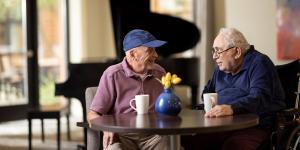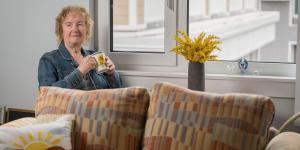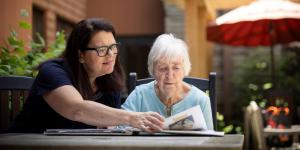Yes, Introverts Can Thrive in Senior Living Communities – Here’s How
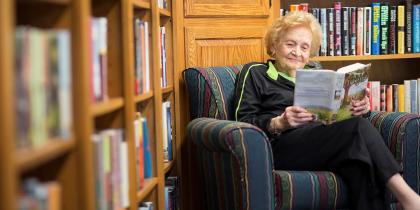
The reasons that older adults choose to move to a senior living community are as varied as the individuals themselves.
For many who move into independent living communities, it’s a lifestyle choice. They see the move as freedom from the responsibilities of homeownership that allows them to pursue travel or other interests and leisure activities.
Others may move to assisted living because their health requires that level of support. And for extroverts, whether in independent or assisted living, they relish the idea of joining a community that affords plenty of opportunities for social interaction.
But what about those who consider themselves introverts?
What makes someone an introvert?
There are various definitions of introversion in psychology. Mary Cain, who wrote the New York Times bestseller Quiet: The Power of Introverts in a World That Can’t Stop Talking, defines introverts as having a preference for a quiet, more minimally stimulating environment. Introversion is different from shyness, which includes a fear of being judged by others.
Often, people assume introverts don’t like being around people and just want to be left alone. But that’s not necessarily the case. Introverts just tend to be more comfortable interacting in small groups and with one-on-one relationships. Introverts aren’t “anti-social,” but they would rather socialize differently than extroverts.
Are there any risks to introverted individuals as they age?
As we age, we can potentially become less independent. We may need to rely on our village for support. If you’re an introvert, your village may be smaller, because that’s your comfort zone. Maybe you have one or two good friends, as opposed to an extrovert who may have hundreds of friends in the community. In that case, if you’re starting to need rides to the grocery store or someone to pick up your mail or remind you that you have a dinner reservation at 6:00, you have a smaller group of people to help you.
The difference between introversion and isolation
Compelling research shows that someone who is isolated is at a greater mortality risk. For that reason it’s important to understand that introversion is different.
A key differentiator between introverts and extroverts is that introverts just need down time to recharge their batteries. They like to be with people but need time to recuperate alone. So, it doesn't mean that an introvert doesn’t want to or wouldn’t benefit from engaging with their community and going to programs and events. It just means that they might do less, and that’s OK. In fact, the upside to introversion is that these individuals are often self-reliant and that is a strength.
Thriving in a senior living community
To begin with, what you can expect from a senior living community depends on the type of community you’re considering.
Independent Living
In independent living, you’re your own project manager. Residents enjoy a high level of autonomy and can choose the types of programs they know they’ll enjoy and can participate in according to their comfort level and schedules.
Assisted Living (Also known as Enhanced Living)
Assisted (or enhanced) living is completely different. There are more staff and a smaller number of residents. Staff know every resident in our communities, and we have the ability to knock on someone’s door or pick up the phone and, in a loving way, show that person that we care about them, and want them to make a contribution and share their gifts by coming to a community event.
In assisted and memory support living, staff recognize that different people may participate in activities in different ways. There’s an understanding that every resident won’t be the person in the front row answering every question and that some people may prefer to be “active observers,” who benefit from an activity if they’re quiet.
Respecting every resident’s story and history
Whether a resident is an introvert, extrovert, or something in between is something that we honor in Hebrew SeniorLife’s senior living communities. Every person who comes to us has a story and a history to tell. We listen and let what we hear inform us as to how we can best meet that individual’s needs. This process is so important because we’re hearing directly from the individuals themselves.
Sometimes, prospective residents or family members will hear about the incredible programming that we offer all day long, and they’re worried. They may ask, “Do I have to do all of that?” And the answer is always “No.”
The resident has the choice and the autonomy to do whatever is most comfortable for them. It’s available but it’s not mandatory. So, if staff knows that a person is more of an introvert and likes to be in their personal space and spend time alone, we’re not going to be constantly knocking on their door encouraging then to come out to programs. That is disrespecting who the person is.
If you’re an introvert, you may choose the programs that are not interactive, where you can sit and absorb information. Examples are a concert or lecture that doesn’t necessarily require interaction with a lot of people around you. Or you could choose smaller programs along with those people with whom you feel the safest knowing they aren’t going to sap your energy.
Older adults move to independent or assisted living with set ideas about what the experience will be like. And what’s beautiful is that the opposite of what we expect can actually happen.
Personalities are not set in stone and may change over time—someone who is an extrovert at one stage of life may become more introverted at a later stage, and extroverts can become more introverted as well.
My advice to residents? Stay open to possibilities. Our communities offer a safe and supportive environment where the goal is to help residents succeed and shine. Staff at all of our locations have great skills and are very invested in making that happen.
Tips for introverts in senior living communities
Introverts can definitely thrive in senior living communities. Here is my advice:
- Think of socialization as a “prescribed” activity, just like medications, exercise, or diet. Social connection is an important part of overall physical and emotional well-being. Work it into your life as you would with any other medically prescribed activity to improve your health.
- Name it. Let your friends and family know how much social connection is comfortable for you and why. Encourage them to invite you to social gatherings and let them know that a no doesn’t mean rejection. It just means you need some down time.
- Connect virtually. Since the pandemic, there are many opportunities to see and be seen from the comfort of your own home. There is much less effort involved in a virtual event: no preparation or travel.
- Be an active observer. Choose in-person events that do not require much one-on-one social interaction, but that still allow you to be stimulated, such as lectures, concerts, spiritual services, and lifelong learning classes.
- Engage in parallel play. Identify enjoyable hobbies that bring people together but that do not rely on verbal exchange. For example: art studio activities, exercising in a gym, yoga, meditation.
- Quality vs. quantity. A few meaningful activities in a week can be more nourishing and satisfying than cramming multiple events into a day just to “check the box.”
- Know yourself. Make sure you plan your events with plenty of recuperation time in between. You need this down time to replenish your energy.
There are many opportunities for low-key socialization in our senior living communities. At Hebrew SeniorLife’s Orchard Cove community in Canton, MA, for example, some of the activities include resident-led book clubs, knitting groups that make teddy bears and blankets for charity, bird-watching and meditation groups, exercise classes like water aerobics, tai chi, and Zumba, and a very active library volunteer committee.
One relatively new annual event at Orchard Cove is the “Miles for Scholarship” fundraiser. This community-wide effort raises money for Orchard Cove’s employee scholarship fund. Residents and staff challenge themselves to complete 26.2 miles of exercise over the course of one month through various activities like the ones listed above, or even just a walk around the Orchard Cove campus. It’s the perfect type of community event for introverts: you can be part of a larger effort while getting in “miles” by yourself when you’d like.
Interested in learning how you can join a community of like-minded friends? Hebrew SeniorLife has options for all lifestyles and income levels. Learn more about what we offer, or contact us today to find your best fit.
Blog Topics
Learn More
A Community for Residents, By Residents
Orchard Cove, in Canton, MA, offers living options that span the full continuum of care, including independent living. The community is bustling with activities, from life-long learning to entertainment.
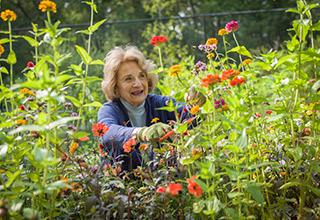
Programming for Every Interest
At Orchard Cove in Canton, MA, you can discover your hidden talents. Whether it's art, discussing current events, writing, cooking, kayaking, or gardening, there are many programs to explore.
